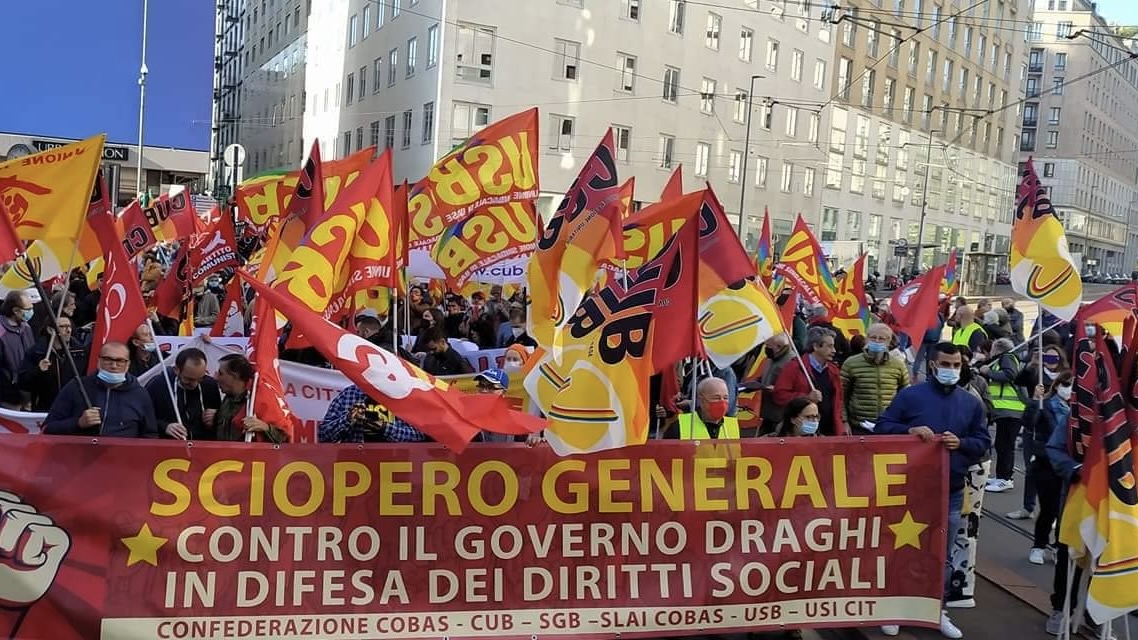On October 11, Monday, trade unions, student and youth groups, leftist political parties, anti-imperialists and housing rights groups organized nationwide mobilizations and general strikes against the government’s anti-people policies and the deterioration of social and economic conditions in the country. In this sense they highlighted the government’s assault on labor rights and imposition of austerity policies, the continued COVID-19 crisis, inflation, the housing crisis, privatization of state enterprises, and the upcoming G20 Summit in Rome, as evidence.
The workers have also protested the far-right attack on the headquarters of the Italian General Confederation of Labour (CGIL) in Rome. Giuliano Granato, national spokesperson of Potere al Popolo commenting on the attack said: “the assault was not just against CGIL but against all institutions and trade unions in our history of workers’ movements. The day after there were many demonstrations all over Italy, there were thousands of people from all parties to show solidarity not just to CGIL, but to the workers’ movement.”
The past couple of months have seen an increase in worker protests across diverse sectors including aviation, automobiles, textiles, and logistics as major companies have cut workers rights and carried out mass layoffs. Granato commented that this is a central motivation for the strike, as “thousands of people are losing their jobs, we cannot let the companies and the government force the workers to pay the cost of this crisis. This is a repeat of 2008, another crisis that they want the workers to pay for. But they have to pay for it, the bosses and the government.”
In the Italian capital of Rome, the October 11 protests were held in front of the Ministry of Public Services and Ministry of Education and the supporters of the general strike marched from the Piazza della Repubblica to the Piazza Santi Apostoli.
Major mobilization were also held in the cities of Turin, Genoa, Milan, Bergamo, Brescia, Trento, Mestre, Trieste, Bologna, Parma, Florence, Pisa, Livorno, Perugia, Campobasso, Naples, Catanzaro, Ctania, Palermo, and Cagliari. Workers from the enterprises of Whirlpool, Fedex, GKN, Gianetti, Logista, Alitalia, UNES, and Teva, who have been fighting layoffs and other assaults, actively took part in the mobilizations and ensured a complete strike at their workplaces.
Workers blocked the Amazon hub in Piacenza, interrupted freight traffic in the ports of Naples and Genoa, and organized pickets in much of the logistics chain. Students in large numbers also joined the mobilizations across the country demanding a safe return to schools and opposing the new school reform plans by the government.
The Unione Sindacale di Base (USB) has stated that “the Draghi Government, its ministers and the anti-grassroots policies they are taking, will be at the heart of this strike…there is a new unit of intent and fight from the base union forces, now present and rooted everywhere, who have not reneged and abandoned the instrument of conflict.”
Leading up to the strike, the Front of Communist Youth (FGC) declared that “two years of pandemic and contagions in schools were not enough for the state to invest in the safety of school buildings. We find ourselves with the same crumbling plexes, buses always crowded and old. They promised us education money, but we find ourselves with increasingly expensive books and the only reforms aim to make our schools become business schools.”
“Monday we take to the square to say enough of this: together with the workers, we block the country. This government won’t do our best: we fight because the future depends on us!”, added the FGC.
The working class across Italy has been devastated by the crisis inflicted by the COVID-19 pandemic and the austerity-driven policies of neoliberal governments in the country. Fascist forces are also resurfacing in the mainstream with the support of far-right mainstream political parties in the country.





